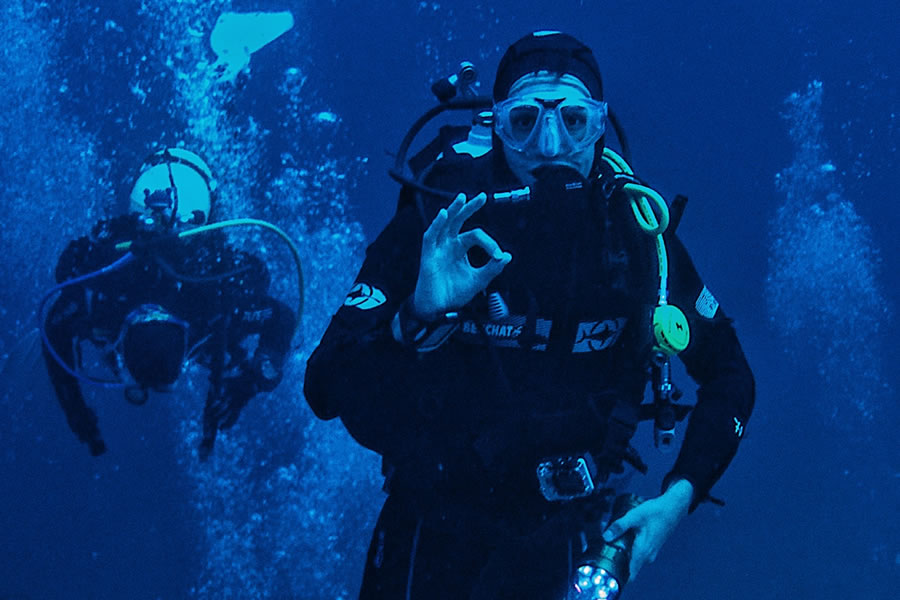🌎 Essential Steps to Follow to be a Safe Scuba Diver

If you dream of diving underwater and exploring a new world, it’s important to follow certain steps to do so in a way that doesn’t endanger yourself, your dive partners, and the environment around you. If you’ve already received your certification, make sure you keep these 12 steps in mind to be a safe scuba diver.
Before Your Dive
1. Be prepared.
You shouldn’t be diving if you’re feeling under the weather, especially if you’ve been drinking or you’re recovering from a cold. You also need to choose a certified diving school for the dives you want to do to make sure there’s experienced staff there and good quality equipment. The number one rule of diving is “plan your dive; dive your plan” so it’s important to follow this and your dive master at all times – they know the area much better than you. Finally, you also need to make sure your travel insurance covers your scuba diving activities to make sure you’re covered for any eventuality.
2. Perform all checks.
Make sure you double check that all your gear is working, and if you have any questions, don’t be shy about asking your guide to look at something. Introduce yourself to your dive buddy if you don’t know them and do your buddy checks with each other’s gear. It’s important that you’re comfortable diving with each other.
During the Dive
3. Breathe regularly.
It can feel crazy at first to be breathing underwater because it goes against all of our instincts, but it’s incredibly important to never hold your breath underwater. You want to breathe normally at all times or you can cause an air embolism when an air bubble enters your bloodstream, a potentially fatal injury.
4. Equalize when descending.
As per Tomas Karlssen, a lifestyle blogger at Essay Roo and State of writing, “when you’re descending underwater, there are huge changes in pressure so you need to constantly equalize your ears. You need to do this before you feel any pain as this can cause injuries in your inner ear.”
5. Stay with the group
Even if you see something interesting, don’t swim away; instead, point it out to you dive buddy and guide so you can head over together. If you do lose your buddy and guide, look around for a minute, including above and below, then ascend slowly to the surface.
6. Monitor your air consumption.
You need to always be aware of how much air you have in your tank so you can ascend accordingly. Your guide should ask for your air consumption regularly, but it is your responsibility to manage your consumption.
7. Dive within your limits.
If you have a dive computer, you need to constantly look at it to make sure you’re diving within your limits. If you don’t have one, never descend below your guide’s depth. You should never be diving deeper than 40m as this is the recreational scuba diving limit.
8. Don’t overexert yourself.
You should be always relaxed underwater. If you’re moving too fast and you’re out of breath or tired, signal your guide and buddy and find a rock without coral to rest.
9. Touch nothing.
According to Hayley Fenton, a travel blogger at Lia Help and Essay writing, “you shouldn’t be touching anything to protect the coral and yourself. Many plants are poisonous, sharp, and creatures can bite you if threatened. Perfect your buoyancy so you’re not hitting any reefs.”
10. Ascend slowly.
You need to ascend slowly when diving because if you go too quickly, nitrogen will enter your bloodstream and you risk getting decompression sickness. If you come up slowly and do your safety stop, the nitrogen will dissipate harmlessly.
After Your Dive
11. Debrief.
Discuss your dive afterwards with your buddy and your guide and take notes on the weights you used, what you saw, and anything you want to work on. This is also when you have to share if you feel at all strange – you may just be tired, but it’s important to tell your guide.
12. Don’t fly for 24 hours.
It’s absolutely crucial that you don’t dive for at least 24 hours after a dive because of the excess nitrogen in your body. If you haven’t given enough time, you’re at risk of getting decompression sickness.
Now you know the 12 steps to scuba dive safely, it’s time to start planning your next dive trip!

Kristin Herman writes and edits at UK Writings and Academized. She is also a contributing writer for Boom Essays. As a marketing writer, she blogs about the latest trends in online advertising and social media influencing.
Last Updated on December 15, 2020

